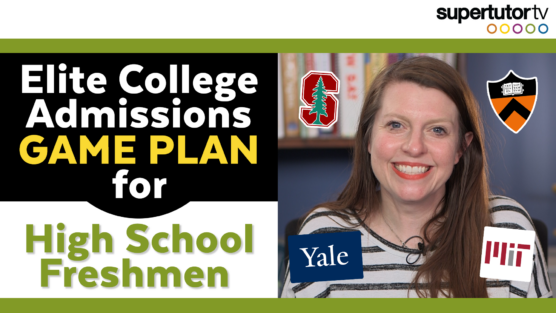Are you a freshman, sophomore, or junior looking to apply to a highly selective college? In this blog, we’ll go over different ways you can improve your chance at admission.
Many students don’t start preparing for college applications until right before their senior year. However, if you wait till then to start planning, there’s only so much you can do to position yourself in the best light. When it comes to very selective colleges, there are super simple strategies you can start to apply early on in high school that will help you tremendously when application time rolls around.
1. Get to Know Your Teachers & Counselors
By the time senior year rolls around, you’ll have to start asking a lot of teachers for letters of recommendation. Your school counselor will also have to give you a letter of recommendation to your university of choice. If these teachers know you, it’s a lot easier to get a glowing recommendation. Now, if you go to a school with thousands of students, it starts to get really difficult to get your counselor’s attention. In this case, we recommend your counselor during the off-season. The off-season would start after the Fall when your counselor is busy dealing with the current seniors’ applications. When there’s a slight lull in January or February, try to go in and meet with them to ask about course selection.
You’ll also need multiple recommendations from teachers. So how do you get your teachers to know you? Oftentimes, teachers have office hours where you can come in before or after class to ask questions. If they have something like that, you should go! You can also catch your teacher for five minutes before class starts. You can also ask your teachers questions to help you explore your interests, such as getting book recommendations. Now, you’re not just another kid who got an A, and your teacher has something to talk about in that letter.
2. Explore Your Interests
Most highly selective colleges and universities are trying to build a “mosaic of students.” They want students who represent all different interests and backgrounds. They don’t want to only admit a bunch of students interested in making a ton of money in either economics or computer science. Ironically, fields that are rewarded in the job marketplace are often discriminated against in college admissions. In any case, you want to have specific, niche interests.
Of course, there are always exceptions to this. For example, if you are from an underprivileged background fighting through a tough situation and you get stellar grades and test scores, then Harvard will want you. Instead, this is in regards to students from well-heeled high schools who already have advantages. So, how do you stand out in a situation where everybody has As and tons of activities.
Examples
By exploring your interests, we don’t mean going to your activities fair and signing up for 20 things. Instead, you need to show initiative and go above and beyond what is easily available to you. An example of this could be checking out tons of obscure books from the library on topics that interest you. This could range from biomedical engineering, evolutionary biology, religious studies, etc. If you find a niche topic that not many people know about and read up on it, you’ll have some cool stuff to talk about on your applications.
The great thing about exploring your interests is you can do it at any financial level. If you don’t have the budget to go to a fancy, established summer program, you can always check out your local library. You can also check out classes at community colleges. Students in California, for example, have access to free community college courses. If you’re a high school student, check in on those programs!
Other examples of exploring your interests include the following: take on a science fair project, write a compilation of short stories and get it published, work on your art portfolio and try to get it hung in local galleries, take courses on architecture, train to be an EMT, intern under a professor at a local college, help out on a local political campaign, or start a local chapter of a national organization like Girls Who Code. It should be something not everyone at your high school is doing. You should go above and beyond!
3. Take Challenging Classes and Get As
On the whole, the majority of students applying to schools like Harvard have incredible grades. If you want more information about the nitty-gritty of what classes to take, check out our video, “How to Choose Your High School Classes.”
4. Prep for the ACT & SAT
Although we live in a test optional world, going test optional does not benefit your profile. Activities are also optional, and you don’t have to list any activities to apply to college. However, your likelihood of getting in is pretty low if you list zero activities or community involvement. If you apply without a test score, you are lowering your chances of admission if you have a great test score. You can’t get that great test score unless you prep. If you don’t have the resources, you can always check out the free videos on our YouTube channel, or websites like Khan Academy.
Many scholarships are tied in some way to your test scores. Having an excellent test score can yield a ton of merit aid to help you pay for school.
5. Stop Worrying
A lot of people freak out about college admissions. For freshmen, sophomores, and juniors, we want you to adjust your expectations now. You can position yourself now to help your odds for highly selective schools. However, we want you to understand that if you have the right scores and the right grades while applying to these top schools, your life outcome will not change regardless of if you actually go to those schools, or even get into those schools. By life outcomes, we mean in terms of how successful you are, or how happy you are with your life. Being a high achiever is what will help you throughout your future. Remember to be your best self, and just see what you’re capable of.




